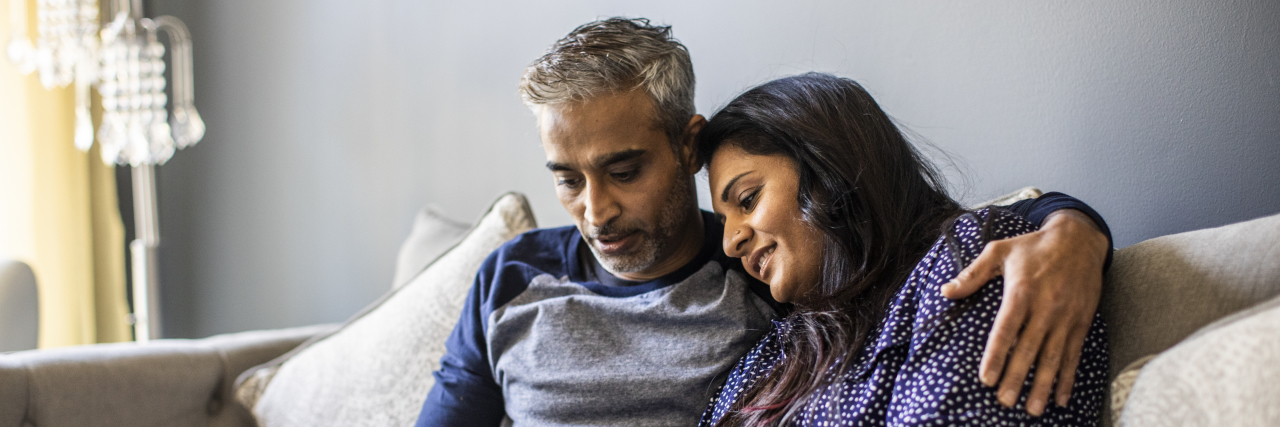We have all seen, heard, or are familiar with the “Hollywood” or “TV Version” of love and intimacy, as couples meet in a passionate embrace and are carried away on wings of love to a night of passion. A candlelit scene, filled with roses, soft music, and champagne sets the mood for a night of intimacy with no interruptions. There are choreographed gymnastics or contortionist moves and clothes flying through the air. We are given a scene that says to all – this is what love and intimacy look like.
The reality is, for many couples, and especially those navigating life with chronic illness, intimacy looks far different. Society has given us this warped impression that to be a “man,” you must have a certain level of virility and prowess. Your body must look a certain way and your skill in this area must be unparalleled, and if you and your partner are not doing things a certain way, a certain number of times, carrying each other to untold heights of ecstasy, then there is something wrong with you.
We build up these unrealistic expectations in our minds and compare ourselves and our relationships to the things we see on TV and in movies – expectations that are impossible to meet and live up to – and we feel like if it does not look like that, there is something wrong. The reality is, these are ridiculous and unrealistic expectations, and they are impossible to live up to. Intimacy will not, or may never, look like this, but because this is what is constantly shown as the “norm,” we constantly judge ourselves by it. Before we even begin, we set ourselves up for failure and discouragement.
This description is what all couples see, and many times judge their relationship by, and that is before you even throw in chronic illness or physical challenges that may have an impact on intimacy. As a man with chronic illness, this definitely has had an impact on my relationship, and when this area is affected, it affects so many others.
For men, this is often especially hard, and even more difficult to discuss. The “little blue pill” is the joke or punchline in so many comments and conversations. The shame and embarrassment that men feel on this issue lead many to simply “suffer in silence” and not find the community of support that so many others with various chronic illnesses and struggles find. Feelings of self-doubt, weakness, inadequacy, depression, isolation, loneliness, fear, anger, grief, shame, embarrassment and frustration all mix together to add a toxic aspect to a relationship already struggling because of a battle with chronic illness.
For many men battling chronic health conditions, this side effect of medication or additional symptom of their condition is the “icing on the cake” of an already difficult path. As these men are already battling physical limitations, this is one more obstacle, one more hurdle, one more physical challenge that they must overcome on an already overwhelming list of physical struggles and hardships.
As men already feel alone and inadequate in their relationship, this additional struggle serves as yet another avenue to place distance and isolation in the relationship. Emotionally, it feeds into the thoughts and fears of being inadequate and “not enough” for their spouse. The fear, frustration, anger, and doubt further distances them from their spouse and creates a self-fulfilling prophecy in situation after situation that causes stress and hurt to continue, until eventually, one or both pull away from one another, totally ignoring the problem by not engaging, shutting each other out or denying each other, making the problem even worse.
Caught up in the thought of what this aspect of the relationship “should” look like according to Hollywood, they miss all that it could be and the different ways it could look because they are so focused on this “one act” and how it should look. Many times, couples in this situation must get creative, and their time together must look different. This issue can be something that breaks or bonds your relationship together. It can become a wedge, or it can become something new, exciting, and beautiful. Too often though, it becomes something that is avoided, dismissed, denied, and cut out of relationships. When this happens, the hurt, pain, and rejection can become overwhelming, and often instead of bonding us together, it tears us apart.
This can and should be something that brings couples together, not tears us apart. Enjoy “it” for what it is in your relationship, no matter what that looks like. Don’t deny, avoid, or reject it because it is not what you think it should be, but enjoy and embrace it for what it is. This will be what brings you together or tears you apart, based on how you view it, and how you interact with each other. Just like your relationship, it will be unique to you and your partner, whether it looks like Hollywood’s version or not.
Getty image by MoMo Productions.

